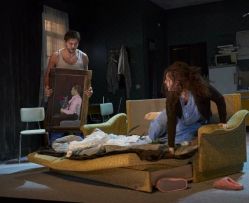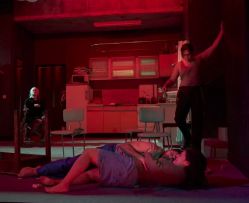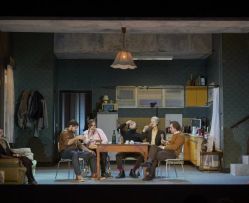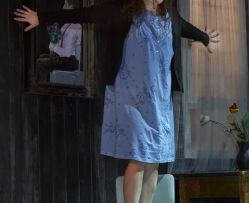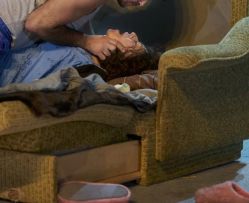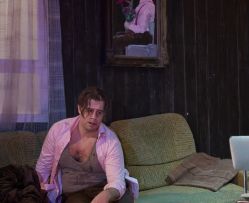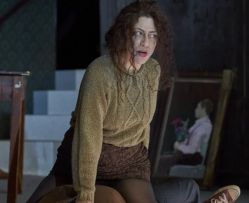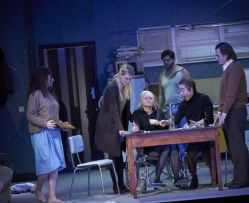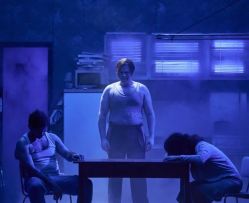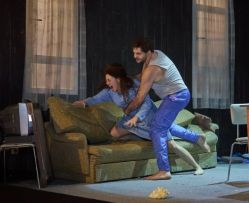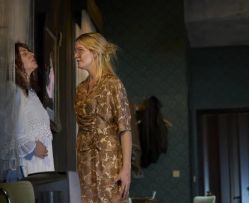Opera in two acts (2001, Chamber version 2006)
Libretto by Gene Scheer
based on the novel by von Emile Zola
first performance:
16 December 2021, 7 pm until 9.30 pm (one intemission)
further performances:
18 December 2021, 7 pm until 9.30 pm (one intermission)
10 | 13 | 17 | 20 January 2022, 7 pm until 9.30 pm (one intermission)
In English with German surtitles
New production of Theater an der Wien at Kammeroper
Austrian first performance
Information:
Due to illness, the premiere on 13.12. Tickets already booked remain valid, ticket holders will be contacted by our ticket office with alternative dates. The first performance will therefore take place on 16 December.
Cast
Synopsis
Thérèse is married to Camille Raquin, her sickly cousin with whom she grew up. After her mother’s death, her father simply deposited her with an aunt. From a young age she was given the task of looking after the ailing boy, and marrying him was the logical conclusion, although she is more of a nurse than a wife. The lives of both are still determined by Madame Raquin who is constantly worried about her son. Camille is now strong enough to work in an office with his friend from younger days, Laurent. Unlike Camille, Laurent finds office work unfulfilling; he wants to be a great painter. That is why he has fallen out with his father and is constantly short of money. He is currently painting a portrait of Camille and is often at the Raquins’ house. Thérèse pretends to find his presence tiresome, but in reality she has an obsessive sexual relationship with the would-be artist. On the evening that he finishes the portrait he tells Thérèse that their relationship is over: he can no longer spare the time for secret meetings because he has to earn some money. Thérèse is devastated. A few days later Thérèse, Laurent and Camille go on an outing to the Seine. It spontaneously occurs to Thérèse and Laurent that they must get rid of Camille if they want to live openly and happily as a couple – with the help of the small fortune that Thérèse stands to inherit from Camille. They take a boat out onto the river and Laurent drowns Camille. Eleven months later Thérèse and Laurent marry at last. But the happiness they long for does not materialise: in their wedding night Thérèse, plagued by her conscience, can no longer love Laurent. In the meantime, Madame Raquin has come to suspect that Camille did not drown by accident. She happens to overhear the guilty couple talking about the murder and is so shocked that she suffers a stroke. Paralysed, she survives as a reminder of the crime. Husband and wife increasingly drag each other down and their love turns to hate. When Thérèse can stand it no longer and announces her intention to report Laurent to the police as a murderer, he prepares to poison her. But Thérèse, driven mad by guilt, stabs herself in front of him. The horrified Laurent drinks his own poison.
Tobias Picker, born in 1954, is one of the most successful contemporary American composers. He received training in classical music and composition from the age of seven, completing it at the prestigious Juilliard School in New York. Picker chose Emile Zola’s novel Thérèse Raquin, a work regarded as one of the first examples of literary naturalism, as the subject matter for his third opera. Zola wanted to analyse “human brutes” under various social and particular conditions. In Thérèse Raquin, unfulfilled dreams and suppressed passions collide with explosive consequences in places and financial and social circumstances that allow little freedom. Zola had already adapted his novel as a play, and countless stage and screen versions followed. Picker originally composed his Thérèse Raquin in 2001 for a large orchestra, adapting it as a chamber version in 2006 which was very much in keeping with the plot and its escalating inner conflicts: the characters’ fears, hallucinations and increasingly stifling distress build up to an irresistible force that drags them down. Picker worked with Zola’s plot, but not his detachment. The figures in his opera are not beasts, but human beings with whom we should feel some affinity. He wants us to feel sympathy for them because, unlike Zola, he is no moralist. According to Picker, the libretto, which consists of eleven scenes that are progressively shorter as the end approaches, should describe “a descent into hell at ever-increasing speed”. The composer’s early work is informed by dodecaphony and rooted in instrumental music. He later expanded his musical language to include elements of tonality and this led to the emergence of his own conception of musical drama of which Thérèse Raquin is an example. Here, the increasing break-up of tonality shows how what is familiar and ordered is more and more undermined by the appalling crime. Harmonious happiness is impossible. The composition is informed by leitmotifs, while arias, ensembles and duets give it its overall structure. Picker draws listeners in with these familiar formal elements and the tonality at the beginning and then uses the music to lead them into an abyss of guilt and remorse.
About the opera
Tobias Picker, born in 1954, is one of the most successful contemporary American composers. He received training in classical music and composition from the age of seven, completing it at the prestigious Juilliard School in New York. Picker chose Emile Zola’s novel Thérèse Raquin, a work regarded as one of the first examples of literary naturalism, as the subject matter for his third opera. Zola wanted to analyse “human brutes” under various social and particular conditions. In Thérèse Raquin, unfulfilled dreams and suppressed passions collide with explosive consequences in places and financial and social circumstances that allow little freedom. Zola had already adapted his novel as a play, and countless stage and screen versions followed. Picker originally composed his Thérèse Raquin in 2001 for a large orchestra, adapting it as a chamber version in 2006 which was very much in keeping with the plot and its escalating inner conflicts: the characters’ fears, hallucinations and increasingly stifling distress build up to an irresistible force that drags them down. Picker worked with Zola’s plot, but not his detachment. The figures in his opera are not beasts, but human beings with whom we should feel some affinity. He wants us to feel sympathy for them because, unlike Zola, he is no moralist. According to Picker, the libretto, which consists of eleven scenes that are progressively shorter as the end approaches, should describe “a descent into hell at ever-increasing speed”. The composer’s early work is informed by dodecaphony and rooted in instrumental music. He later expanded his musical language to include elements of tonality and this led to the emergence of his own conception of musical drama of which Thérèse Raquin is an example. Here, the increasing break-up of tonality shows how what is familiar and ordered is more and more undermined by the appalling crime. Harmonious happiness is impossible. The composition is informed by leitmotifs, while arias, ensembles and duets give it its overall structure. Picker draws listeners in with these familiar formal elements and the tonality at the beginning and then uses the music to lead them into an abyss of guilt and remorse.
